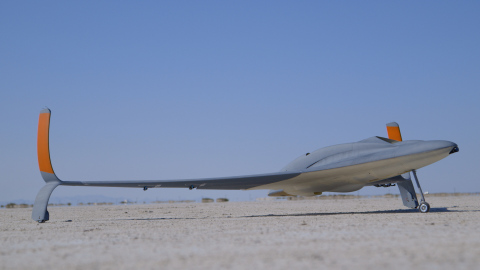Leading provider of advanced unmanned systems and aerospace vehicles leverages the power of 3D printing to reduce design and build time by 50 percent
3m wingspan UAV is 80% 3D printed, with lightweight Stratasys materials key to breaking speeds of 150mph
MINNEAPOLIS & REHOVOT, Israel — (BUSINESS WIRE) — November 9, 2015 — Stratasys Ltd. (Nasdaq: SSYS), the 3D printing and additive manufacturing solutions company, today announced that it has teamed with Aurora Flight Sciences to deliver, what is believed to be, the largest, fastest, and most complex 3D printed unmanned aerial vehicle (UAV) ever produced. Unveiled for the first time at this week’s Dubai Airshow (Stand 206), the high-speed aircraft is built using lightweight Stratasys materials to achieve speeds in excess of 150mph.
This Smart News Release features multimedia. View the full release here: http://www.businesswire.com/news/home/20151109005240/en/

Making its global debut at the Dubai Airshow, Aurora Flight Sciences' high-speed UAV is 80% 3D printed with Stratasys additive manufacturing solutions. Photo: Stratasys
To realize the joint goal to design and develop an advanced 3D printed demonstration aircraft, the final UAV – which has a 3m (9ft.) wingspan and weighs only 15kg (33lb.) – leveraged 3D printing for 80 percent of its design and manufacture and is built on the expertise of Aurora Flight Sciences’ aerospace and Stratasys’ additive manufacturing.
According to Dan Campbell, Aerospace Research Engineer at Aurora Flight Sciences, the project achieved various targets. “A primary goal for us was to show the aerospace industry just how quickly you can go from designing to building to flying a 3D printed jet-powered aircraft. To the best of our knowledge, this is the largest, fastest, and most complex 3D printed UAV ever produced.”
“This is a perfect demonstration of the unique capabilities that additive manufacturing can bring to aerospace,” says Scott Sevcik, Aerospace & Defense Senior Business Development Manager, Vertical Solutions at Stratasys. “This meant using different 3D printing materials and technologies together on one aircraft to maximize the benefits of additive manufacturing and 3D print both lightweight and capable structural components.”
For Aurora, Stratasys’ additive manufacturing solutions provided the design-optimization to produce a stiff, lightweight structure without the common restrictions of traditional manufacturing methods. This also enabled the cost-effective development of a customized – or mission-specific vehicle – without the cost constraints of low-volume production.
Design and build time cut by 50 percent with Stratasys 3D printing
solutions
“Stratasys 3D printing technology easily supports
rapid design iterations that led to a dramatically shortened timeline
from the initial concept to the first successful flight,” adds Campbell.
“Overall, the technology saw us cut the design and build time of the
aircraft by 50 percent.”
According to Sevcik, the project exemplifies the power of Stratasys’ flagship Fused Deposition Modeling (FDM) 3D printing technology.
“Aurora’s UAV is a clear evidence of FDM’s ability to build a completely enclosed, hollow structure which, unlike other manufacturing methods, allows large – yet less dense – objects to be produced,” he explains.
“In addition to leveraging FDM materials for all large and structural elements, we utilized the diverse production capability of Stratasys Direct Manufacturing to produce components better suited to other technologies. We elected to laser sinter the nylon fuel tank, and our thrust vectoring exhaust nozzle was 3D printed in metal to withstand the extreme heat at the engine nozzle,” Sevcik adds.
“Because Stratasys is able to produce parts that meet the flame, smoke, and toxicity requirements set by the FAA, ULTEM™ has become the 3D printing material of choice for many of our aerospace customers for final production applications,” he continues.
For Sevcik, this particular collaborative project with Aurora achieves one of the foremost overall goals among aerospace manufacturers, as well as those in other industries, which is the need to constantly reduce weight.
“Whether by air, water or on land, lightweight vehicles use less fuel. This enables companies to lower operational costs, as well as reduce environmental impact. In addition, using only the exact material needed for production is expected to reduce acquisition cost by eliminating waste and reducing scrap and recycling costs,” he concludes.
The high-speed Aurora/Stratasys UAV is being showcased at this year’s Dubai International Airshow (8th – 12th November, Dubai World Central) on stand no. 206. To view the video customer story, please visit: http://www.stratasys.com/industries/aerospace/fdm-uav
*As a percentage of overall weight.
For more than 25 years, Stratasys Ltd. (NASDAQ:
SSYS) has been a defining
force and dominant player in 3D printing and additive manufacturing –
shaping the way things are made. Headquartered in Minneapolis, Minnesota
and Rehovot, Israel, the company empowers customers across a broad range
of vertical markets by enabling new paradigms for design and
manufacturing. The company’s solutions provide customers with unmatched
design freedom and manufacturing flexibility – reducing time-to-market
and lowering development costs, while improving designs and
communications. Stratasys subsidiaries include MakerBot and Solidscape
and the Stratasys ecosystem includes 3D printers producing prototypes
and parts; a wide range of 3D printing materials; parts on-demand via
Stratasys Direct Manufacturing; strategic consulting and professional
services; and Thingiverse/GrabCAD communities with 5+ million free
design components, printable files. With 3,000 employees and 800 granted
or pending additive manufacturing patents, Stratasys has received more
than 30 technology and leadership awards. Visit us online at:
www.stratasys.com
or
http://blog.stratasys.com








